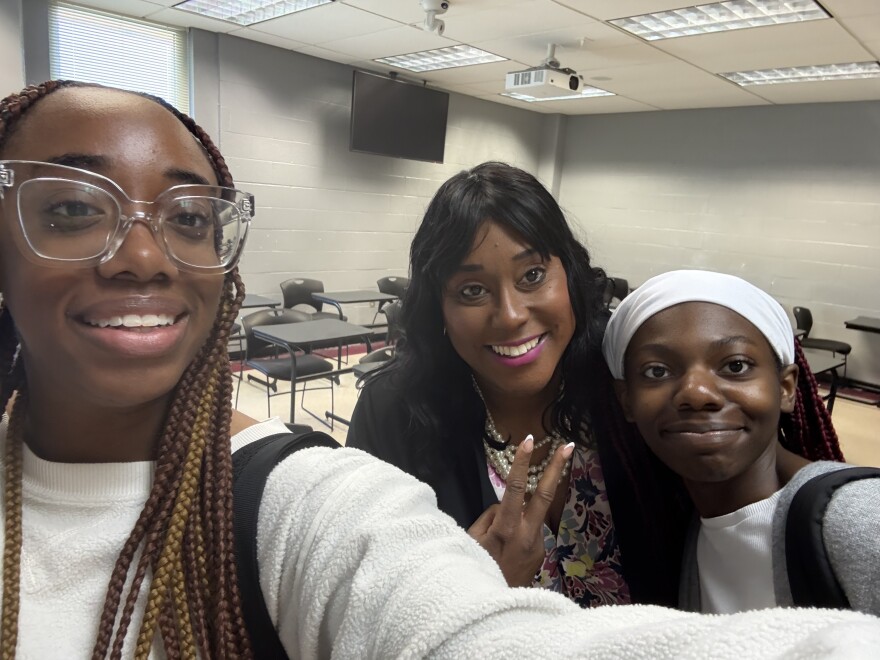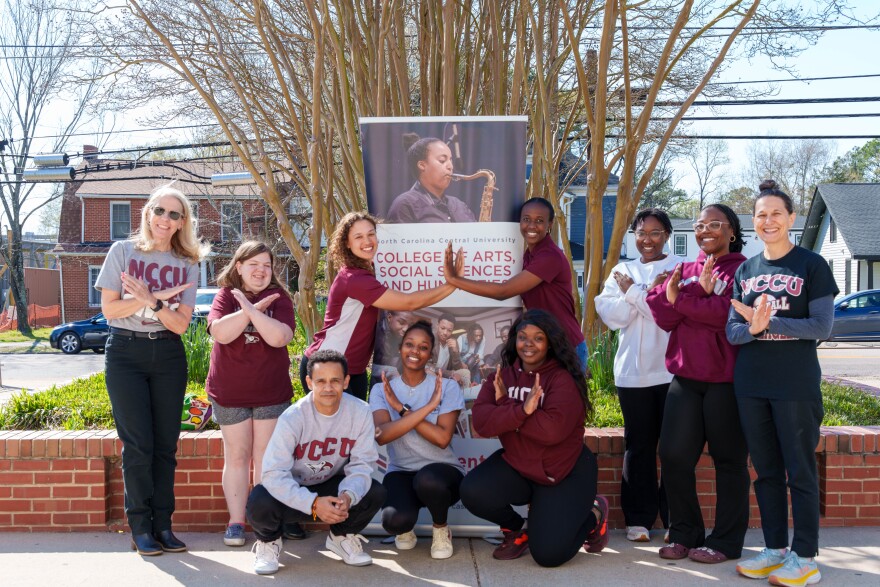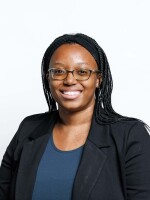North Carolina Central University has long had a physical archive. The HBCU's collection spans centuries with texts from the antebellum period, first edition novels written by authors like W.E.B Dubois and Phyllis Wheatley, and various other invaluable Black history narratives.
But the HBCU has never had an oral history archive - until English professor Rachelle Gold launched the first earlier this year.
The CLEOPATRA archive contains oral histories of Black women who graduated from NCCU in the past 60 years – with the oldest alumna graduating in 1962 and the youngest in 2015.
Gold said she chose to focus the archive on alumnae because she feels that history has traditionally been overlooked.
"We have had only two women permanent chancellors at Central; we have only three women on the Board of Trustees," Gold said. "We have 70% of our students who come in are women and by the time we get to commencement, 80% of our graduates are women. And so, there's what I consider a mismatch in terms of administrators and the representation related to campus buildings or the campus face. And I want to bring the voice and the visibility more to the foreground."
Gold's idea for the archive came about in a gender studies class on the intersection of womanhood and ethnicity. As her course progressed, Gold said she noticed a theme of female students of color feeling unseen and unheard in society.
Shortly after the class ended, the Mellon Foundation asked for funding proposals related to social justice in higher education.
"And I thought, wow, this is an opportunity," Gold said. "For me, justice is about including the voices of as many people as possible to create a rich tapestry."
"And as a daughter of someone who is a history teacher, I have a deep love of history," she continued. "And then also as someone who's Jewish, there's that profound experience of knowing that we have these oral histories of Holocaust survivors because of various history projects across the world that have preserved those stories. It's important to have historical record of everyone."
The foundation awarded Gold $500,000 to create NCCU's oral history archive. Since 2023, Gold and her colleagues have taught six cohorts of students who have recorded 32 alumnae stories.

All the women in the archive come from social justice-based careers. This includes lawyers and politicians, but also positions Gold said people wouldn't initially associate with justice like scientists, librarians, and entrepreneurs – like 2005 graduate Crystal Taylor.
"As a Black woman, a Black person in today's society, I wish we could have seen stories from my mom's time," Taylor said. "You know, we see pictures. Sometimes we see some video here and there. But to have an interviewed archive of people, sisters and brothers from the 50s, 60s, 70s?"
"These things matter – to hear what people's lives were like and what they went through and what they experienced," she continued.
In her oral history, Taylor talks about her rural upbringing in Clinton, the joys of being a mom, and how she went from being uncertain about her future to working for herself.
Her two current businesses focus on creating spaces for people of color where there typically hasn't been. The Underground Collective connects people with local creatives and hip-hop artists; and Get Happy seeks to break stigmas surrounding the Black community and help them health through their traumas.
Taylor has also co-founded several well-known community events in Durham like Black August in the Park, the Black Farmer's Market, and the Beats and Bars Festival. She hopes the archive can foster a similar belonging for both future Eagle alumni and the greater community.
"You're doing something. You're creating something. You're putting it out there to inspire, to help somebody," Taylor said. "You don't know who, but it will manifest something in people. To inspire them, to jolt them, to push them. And these archives do that."
Another layer of the project, Gold said, is giving back to students. She's earmarked half of her funds, or about $250,000, to go directly to them. That gives each student who takes her class a $1,500 stipend.

In addition to collecting oral histories, students also spend the class watching documentaries, going on field trips, and reading books about Black women with a North Carolina connection. This includes Incidents in the Life of a Slave Girl and Hope and Dignity: Older Black Women of the South.
At the end of the semester, they reflect.
"The students are writing about sisterhood," Gold said. "They're writing about having a mentor. They're writing about (that) they are Black women at NCCU, but they did not know the history of the contributions Black women have made to the state, locally, nationally, internationally."
Rising junior K'Mari Greene took the class this past spring and chronicled the life of a North Carolina superior court judge. She said the course has been an enriching experience.
"We're the first (North Carolina) HBCU to have an oral history archive like that," Greene said. "And just being a part of that history, not only talking about the women that we're talking about in the archive. But also being a part of that ourselves. We're also in it, like we're also making history."
Gold's goal is to have students collect 60 oral histories before the grant funding runs out. Her last class is set to end in spring 2027, but she's hoping to keep the archive going well past that.
"I want it to be a living archive," Gold said. "More people adding to it, more people looking at it. And to find a way that women who graduate are saying 'in 10 years, I want to be interviewed, because I want to give back to my alma mater.'"
WUNC partners with Open Campus and NC Local on higher education coverage.







